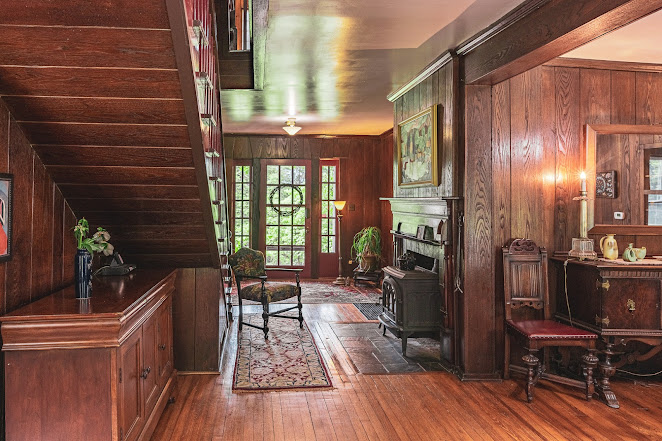Black Mountain Inn
Postcard: This divided back era postcard shows a lightly colored depiction of the Black Mountain Inn. The postmark on the back of the postcard is not entirely legible, but we believe it to read "July of 1910." Nestled within a tree preserve dating back to the 1700s, the Black Mountain Inn has nearly 200 years of history in Black Mountain. The building itself is three stories and almost 5,000 square feet with eight bedrooms and eight baths sitting on five acres. The Inn was originally built as a stagecoach stop by John Stepp around 1830 and was renovated and expanded in 1940. At its peak, the Inn had would host as many as 16-20 people for breakfast that were staying in the eight available rooms. Today, the Black Mountain Inn is still in operation off of Old US Highway 70.
Source: Swannanoa Valley Museum & History Center facebook page
My post from 2020 follows:
It's set back from the road, up on a tall hill, overlooking both Old US 70, and the newer US 70, and the railroad running from east to west and back. Many trees are on the slope up to the old building, but they were cleared out a bit a few years ago, so you can now see the building from the road. For many years it was wild looking land, and only some brave folks would go up the gravel road to see it.
This sign shows a favorite gathering place, the Dynamite Coffee Shop with its red roof. It lies very close to the junction of the 2 US 70 highways. I live in the other direction a couple hundred feet also off Old US 70. This was the first time I drove up the steep driveway to take some photos.
Here's the link to their own internet site.
And I wanted to find out a bit of the history of the building, so I'm quoting from their web-page.
Originally designed as a stagecoach stop, the inn was built circa 1830 and for more than 100 years it underwent several transformations. At the turn of the 20th century it operated for several years as the Franklin Humanitarian Home (a TB sanatorium).
Notably, in 1940, as the famed Black Mountain College approached its zenith, the property was purchased by Mary Aleshire and Daisey Erb. Mrs. Aleshire was the manager of the Norton Art Gallery in Palm Beach, Florida. She artfully restored and updated the historic property. In 1942, the house was opened as the Oak Knoll Art Studio, which served primarily as a summer artist's retreat for Mrs. Aleshire and her many famous guest; Ernest Hemingway, John Steinbeck, Norman Rockwell, Helen Keller, Anne Sullivan and Joan Sutherland among them.
In 1965, wishing to preserve the house, and prevent commercial development the Aleshires sold the house to their caretaker Jim Reid.
The house was purchased again in 1989 and lovingly restored by its current owners, who transformed it into the Black Mountain Inn. Since then, we have been privileged to return this wonderful inn to the tradition of welcoming guests to the magnificent Blue Ridge Mountains.
I think when they say "prevent commercial development" they were referring to something besides a B&B...maybe?
The following photos are all from their web site.









It looks charming inside. Too bad the outside lost its verandahs. That also happened to a little hotel in town, which lost its whole top story in a fire.
ReplyDelete...this is a beauty! I reminds me of the many TB sanatoriums in Saranac Lake, in the Adirondacks.
ReplyDeleteProbably built or at least used for the same purpose at the same time.
DeleteYes, with air conditioning, I dare say the verandahs weren't being used...but they sure did add to the look of the place!
ReplyDeleteThe B&B looks beautiful, I hope it is doing well. Have a great day!
ReplyDeleteThanks Eileen. Hope your weekend is great.
DeleteIt is too bad the verandas were removed as they added a nice old fashioned touch. But as pointed out, with air conditioning in more modern times, they probably weren't used all that much so the constant upkeep was a chore not needed.
ReplyDeleteThere is that to consider. And it probably meant the rooms had less sunlight coming in, if that's something you want. For many who love antiques, they don't want sunlight touching them.
DeleteThe Black Mountain Inn looks like a fun place to visit with its historic setting and plenty of atmosphere.
ReplyDeleteThank goodness it was saved from dereliction, though a pity too about the loss of the verandahs - I always associate them with the USA - we just don’t have them here in Scotland and I can see myself in a rocking chair relaxing in the warmth of a sunny day!!
Yes, there is that to be said for a veranda. We do have a history in the south of porches and rockers.
DeleteA lovely old place! The verandas would not be for me, as I like light coming in. The wood work is fantastic!
ReplyDeleteI recently was in Black Mountain and drove past the inn. I've often wondered what it would have looked like back in the day when rail service connected WNC to the the rest of the world. Now I'm curious how the couple from Florida discovered it in the 1940s. They must have been among the first Floridians to migrate north in search of a cooler climate. As I understand, it was the invention of air conditioning (and mosquito-proof screen wire too) that allowed Florida to be developed.
ReplyDeleteA lovely building inside and out. Nice that you had that postcard to show the Inn as it was then, compared to now. They've done a wonderful renovation -- and "development" likely refers to big box stores and such, definitely not an inviting BnB.
ReplyDelete